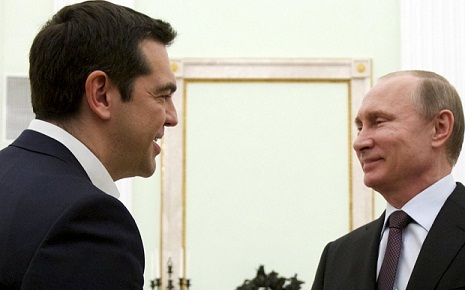Although Greek officials have said that Mr. Tsipras would not use the visit to appeal directly for financial assistance from Mr. Putin, the prime minister’s public criticism of Western sanctions against Russia as “a road to nowhere” has heightened concerns that the visit is evidence of emerging cracks in European unity over the Kremlin’s policies in Ukraine.
Appearing briefly together at the Kremlin before their meeting on Wednesday afternoon, the two men appeared relaxed, with Mr. Putin in a suit and tie, and Mr. Tsipras dressed more casually in a blue blazer and a white shirt open at the collar.
Greece, like some other European countries, has suffered from Russian countersanctions barring the import of agricultural products, and Mr. Putin emphasized that trade would be a primary focus of the talks.
“We need to discuss the issues of recovery of the trade rate of growth,” he said, noting that trade between Greece and Russia had doubled from 2009 to 2013, but last year dropped by 40 percent.
“This is why we have to recover the rate of growth,” Mr. Putin said.
Expounding on his point that the meeting was well timed, Mr. Putin noted that it was occurring just before Orthodox Easter, and that Greece and Russia share “common spiritual roots.”
Mr. Tsipras said he expected their meeting to address “stability and security” in the broadest sense of those terms.
For Russia, the visit is a welcome departure from the mostly tense interactions between the Kremlin and the West over Ukraine, including mounting frustration over the lack of movement toward implementing the political components of a cease-fire agreement signed in February that was brokered by Mr. Putin, President François Hollande of France, President Petro O. Poroshenko of Ukraine, and the German chancellor, Angela Merkel.
The increasing isolation of Russia has led the Kremlin to make substantial efforts to illustrate its improving relations with Asia, and the Russian news media on Wednesday also played up an invitation that was extended to Mr. Putin to visit Thailand. That invitation was received by Prime Minister Dmitri A. Medvedev, who was in Bangkok on an official state visit focused on economic ties.
Within Greece and among the nation’s European partners, the meeting between Mr. Tsipras and Mr. Putin has been viewed as an effort by the new Greek leader to seek allies as the country runs out of cash amid a deadlock with creditors over a desperately needed 240 billion euro, or about $261 billion, bailout.
Greece is teetering on the edge of bankruptcy and recently warned it would have trouble funding government operations and repaying some of its lenders.
In a bid to quell concerns of a default, the Greek finance minister, Yanis Varoufakis, made a surprise trip to Washington this weekend, where he assured Christine Lagarde, the head of the International Monetary Fund, that Athens would come through with a €450 million payment that is due on Thursday.
Greece, however, will still need billions more in financial assistance from other nations for the foreseeable future, and any new aid package is likely to come with harsher austerity terms than Mr. Tsipras would like.
By strengthening ties with Moscow, analysts said Mr. Tsipras might be testing the waters to determine whether Russia would be an ally in the future, should Greece find itself backed into a corner.
Russia, however, has been grappling with its own financial difficulties brought about by a sharp decline in oil prices and by Western sanctions. In recent days, the ruble has recovered somewhat against the dollar, and the price of oil has also stabilized, although it is lower than Russia needs to maintain its budget in coming years.
There are, however, steps that Russia could take to assist Greece, including a partial easing of the countersanctions, which have barred imports of important Greek agricultural commodities including soft fruits.
Greece is also said to be seeking a discount on Russian natural gas, perhaps as part of a larger deal with Gazprom, the Russian state-controlled energy giant. That deal could include construction of a pipeline through Greece as part of an effort by Russia to build a pipeline through Turkey that would help end its reliance on Ukraine for transporting gas to customers in Europe.
In an interview with the Russian news agency Itar-Tass before the trip, Mr. Tsipras said he believed Greece could act “as a link and a bridge” between Russia and the West.
Officially, Mr. Tsipras’s visit is focused on enhancing energy and economic ties between the two countries, including securing a three-year action plan with Russia in those areas. Mr. Tsipras will also try to bolster Russia’s appetite for tourism, trade, energy and investment.
Travel abroad by Russians has plummeted in recent months, largely because of the collapse of the ruble, which has made trips far more expensive.
Western diplomats have insisted that ultimately Greece would not stray far from its European partners, and indeed could not survive financially without their help.
Still, there are signs of alarm. Guy Verhofstadt, a member of the European Parliament and the former prime minister of Belgium, posted his disapproval on Twitter. “The Greek prime minister should stop trying to play Putin against the E.U. Putin cannot save Greece. The E.U. can.”
In a second post, Mr. Verhofstadt wrote: “The future of Greece lies within the EU. Tsipras should play according to the common rules and conduct serious reforms.”
Martin Schulz, the president of the European Parliament, warned Mr. Tsipras about “alienating” the European Union in an interview with a German newspaper this weekend, and said it would be “unacceptable if Tsipras jeopardized Europe’s common policy on Russia in return for Russian help.”
Germany’s economy minister, Sigmar Gabriel, told the Rheinische Post that it seemed unimaginable that Athens would play “with the idea of turning their back on Europe and falling into Moscow’s arms.”
More about:
















































